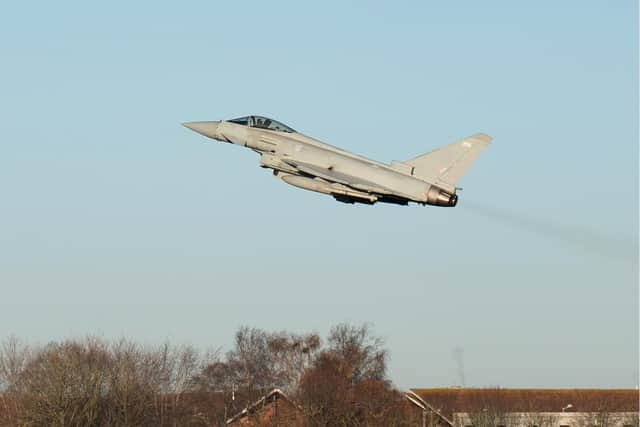'Sonic boom' heard as Typhoon is scrambled - days after fighter jets cause houses in Sheffield to shake
and live on Freeview channel 276
Many people in central England described hearing a loud bang, which was said to have shaken the ground, at around 12.15pm today, Saturday, March 4. Leicestershire Police said it had received ‘numerous calls in relation to a large explosion sound heard from various parts of the city and county’. The force added: “We like to reassure you that there is no concern however thank you for your immediate response to us.”
Aviation Highlights tweeted that the ‘big bang’ people had heard was a sonic boom caused by two Eurofighter Typhoon jets flying faster than the speed of sound to engage an aircraft that was not responding to air traffic control. “The fighters were reportedly supersonic on their way south from RAF Coningsby,” it added.
Advertisement
Hide AdAdvertisement
Hide AdThe loud bang could reportedly be heard from Leicester to Oxford, some 70 miles further south. It comes just two days after The Star reported how eight fighter jets – four F-16s from the Belgian Air Force and four F-18s from the Finnish Air Force – had thundered over Sheffield on Thursday, March 2. People in the south and west of Sheffield, and in North Derbyshire, reported feeling their houses shake as the planes roared past while on a training exercise.


They were taking part in RAF Exercise Cobra Warrior, a large-scale military training exercise involving air forces from around the world, including Saudi Arabia, India, Finland, Belgium and the US, with planes arriving this week at RAF Coningsby and RAF Waddington in Lincolnshire. Exercise Cobra Warrior takes place twice a year and, according to the RAF, is designed to ‘train participants in high intensity, large force, tactical air warfighting operations’. The latest exercise began on Thursday, March 2 and is scheduled to run until March 24, with 70 aircraft involved.
A sonic boom is caused when planes fly faster than the speed of sound, which at ground level is around 761mph. The aircraft displaces the air and creates pressure waves that become compressed and then released in a shock wave.
A spokesperson for the Ministry of Defence said: “Typhoon aircraft from RAF Coninsgby offered assistance to a civilian aircraft and were authorised to fly supersonic.”
Advertisement
Hide AdAdvertisement
Hide AdThe Ministry of Defence explained that the civilian aircraft was directed to Stansted Airport and landed safely. It said the RAF’s (QRA) aircraft are held at immediate readiness to protect the United Kingdom and can take off within minutes. QRA are launched to intercept unidentified aircraft because the aircraft cannot be identified by any other means. i.e. the aircraft is not talking to civilian or military Air Traffic Control, has not filed a flight plan and / or is not transmitting a recognisable secondary surveillance radar code, the MoD said.
The paramount duty of the RAF is to control the air over the UK and, when necessary, UK interests overseas, it explained, adding that its multi-role Typhoon fighter squadrons are completing QRA duties from RAF Coningsby (Lincolnshire), RAF Lossiemouth (Scotland) and in the Falkland Islands.